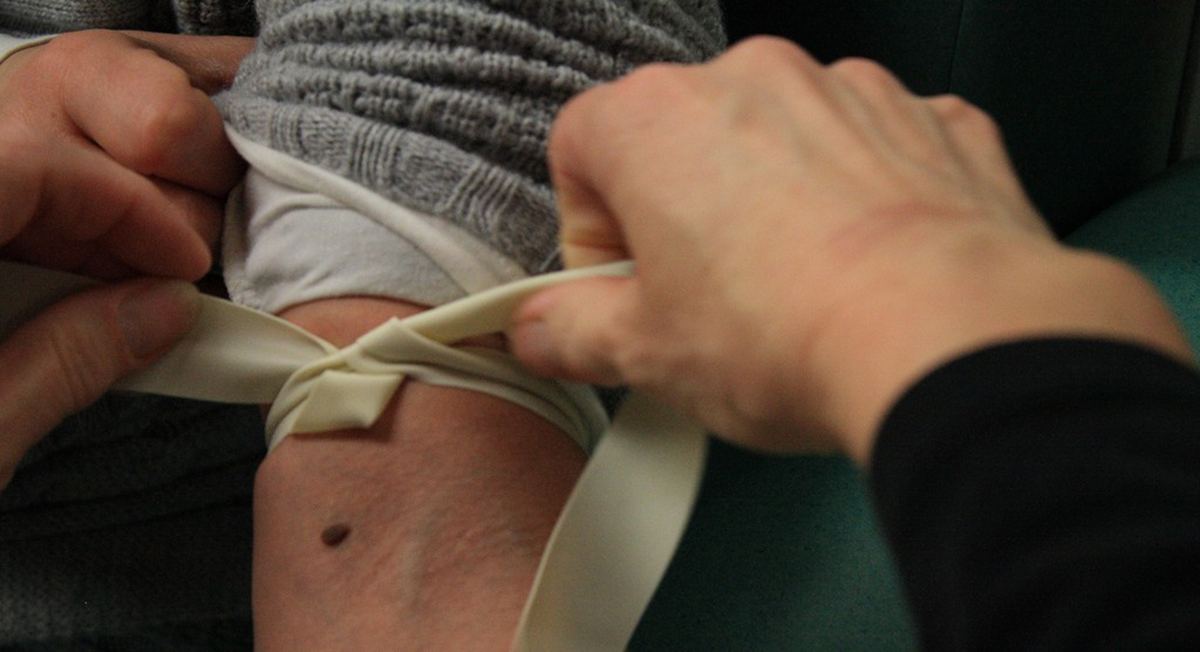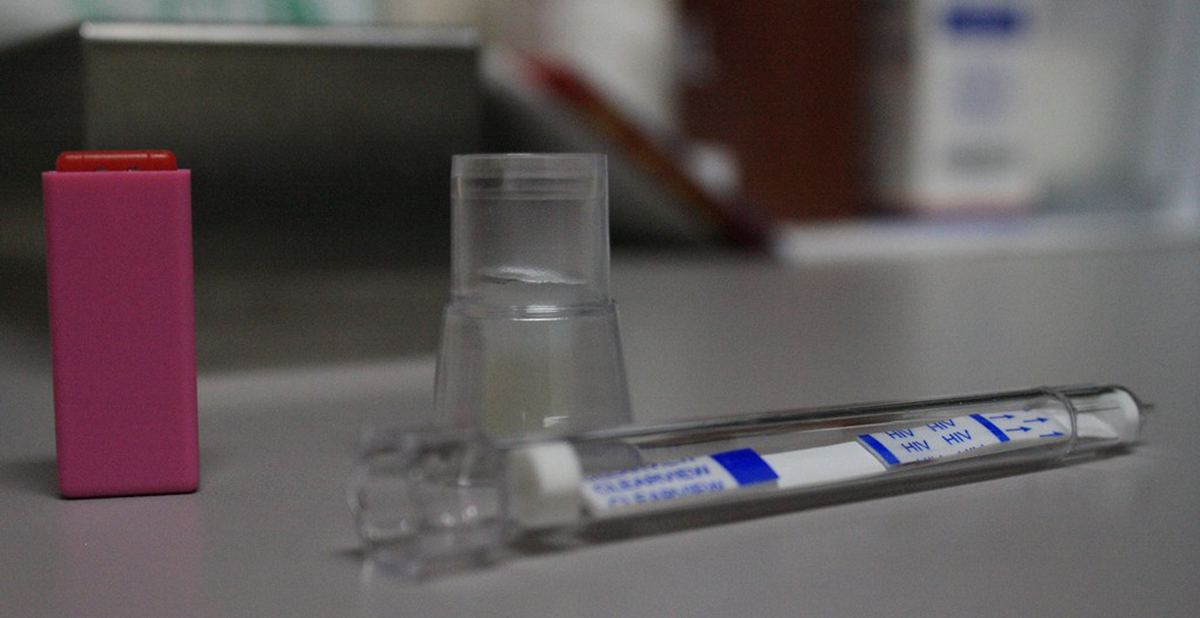HIV is, without a doubt, something scary. Terrifying, in fact.
Some of us remember the days when HIV was a definite death sentence — something that gradually attacked its victims' immune systems, making them look like concentration camp inmates and eventually taking their lives, after a few near-misses and cancers, through pneumonia or something like that.

Many of us still associate HIV with certain populations, like gay men and people from sub-Saharan Africa, though most have heard that anyone who has unprotected sex could be at risk of contracting the virus. And indeed, while the vast majority of us know that you can't get HIV by spending time in the same room as a HIV-positive person or shaking their hands, a lot of us would still be afraid to interact closely with someone who has "the virus".
Are You Scared Of HIV — Or Not Scared Enough?
Despite all of this, some of us continue to engage in risky sexual behavior. We might be convinced our partners couldn't possibly be HIV positive, or we might not give HIV and other sexually-transmitted diseases a second thought while we're getting undressed. Shockingly, some have drawn the wrong conclusion about HIV.
If you're young and from a developed western country, you'll have "missed out" on the HIV/AIDS scare campaigns and instead heard only good news about how people with HIV can now have a near-normal life expectancy, have children without passing the virus on, and take a pill or two a day to stay healthy.
If you're gay and enjoy an active sex life with multiple partners, you might even already have come to the conclusion that HIV is pretty much inevitable. It happens. There's a rumor that some people are actively looking to be infected with HIV, a phenomenon known as "bug chasers". That's sick, and the fact that people are talking about this at all shows that people in the West aren't as scared of HIV as they should be.
Get Tested!
Have you ever had a risky sexual encounter? Think back. Many people will be able to say "yes", if they're being really honest. If you're answer is yes too, have you had yourself tested for HIV? Those who haven't been tested might simply not have considered the possibility they had the virus, particularly if they never experienced any symptoms. Some will definitely have thought about it, but would rather go on living without knowing.
See Also: Sixty-Second HIV Testing Now Available In The USA
Is there any chance you could have picked up HIV, recently or a long time ago — and from a casual encounter or a long-term partner? Remember, you being monogamous doesn't necessarily mean your partner is or was. It's time to get tested. Getting tested will give you peace of mind if the result is negative. If it's positive, knowing you have HIV can save your life.
Not convinced yet? On the next page, we'll tell you a little more about how HIV progresses, and what life with the virus is like for those on anti-retroviral treatment and those not receiving any treatment.
HIV: Knowing You're Positive Vs Not Knowing
What Happens To The Body When You Have HIV
HIV, the Human Immunodeficiency Virus, invades the body's immune cells (CD4 cells and T-cells) to make copies of itself. Unlike other viruses, HIV does not get cleared from the body by the immune system. It can, however, become part of a patient's DNA and lie dormant for many years — even decades.

Most people who are infected with HIV will have characteristic symptoms within a month or two. Because these symptoms are quite general, it's hard for patients to recognize them as the symptoms of a HIV infection. We've all had a fever, headache, muscle aches, joint pain, a sore throat and diarrhea. Get these symptoms, and you'll probably think you have the flu rather than immediately suspecting HIV. Primary HIV infection also often comes with a skin rash, chills, mouth and genital ulcers, and swollen lymph glands.
After the initial infection, infected people may feel and look healthy for a long period. Some experience persistently swollen lymph glands during the latent stage of infection, something that one can easily miss. Mild chronic symptoms like fever, fatigue, diarrhea, weight loss, cough, and shortness of breath will be noticed. They could easily be attributed to unrelated things like being stressed or smoking cigarettes. And remember, not everyone with HIV will develop these symptoms. During this stage, you can pass HIV on to others though you may have no idea you have it.
Over 1.1 million US residents are currently living with HIV. According to estimates, one in six HIV+ people are unaware they're infected. Not being aware you're infected means not receiving any treatment.
AIDS stands for Acquired Immunodeficiency Syndrome, and it's the final stage of HIV. By the time you get there, your immune system will have been severely compromised and you'll be prone to infections that aren't usually a big deal in healthy individuals. Rapid weight loss ("AIDS wasting"), recurring fever and night sweats, extreme fatigue, swollen lymph glands, chronic diarrhea, sores in the mouth, anus and genitals, and colored blotches under the skin can all be part of AIDS.
Pneumonia, dementia, kidney disease, lymphoma, cervical cancer, anal cancer, tuberculosis, and diabetes are all often associated with AIDS as well. AIDS is not a disease in itself — rather, it's the final stage of HIV, during which your immune system will have become damaged to the point that your body will not be able to fight off opportunistic infections.
If you're HIV positive without knowing it, you may live for around 10 years without having a clue that your body is on its way to AIDS. When you finally seek treatment for an opportunistic infection or obvious symptoms and get diagnosed, it may be too late. In 2010, an estimated 15,529 US residents with an AIDS diagnosis died. This will be in your future if you are not diagnosed in a timely manner too.
Living With A HIV Diagnosis
What if you get tested and find out you are HIV positive? You'll be terrified and wondering what to do next. You will also be able to access anti-HIV (antiretroviral) drugs, which stop the HIV virus from reproducing and serve to keep your immune system as strong as possible.
There are now over 20 different antiretroviral (ART) drugs, though they're not all available in every country. If you live in a developed nation, you are more likely to have access to the most effective HIV treatment. HIV treatment usually involves a combination of three different drugs, which may be combined into one pill.
See Also: HIV/AIDS Infected?: Do not panic, read this!
Though it's incredibly important to take all the doses of HIV drugs, these drugs offer many HIV positive people a long and relatively healthy life. You and your immune system will be monitored frequently to see if the drugs are working and to keep you healthy.
People on ART have a very good chance of enjoying a healthy, productive and normal life. With treatment, HIV does not need to progress to AIDS. Living with HIV may be frightening, but having treatment is a whole lot less scary than refusing to get tested and dying of AIDS.
- Photo courtesy of Wheeler Cowperthwaite by Flickr : www.flickr.com/photos/wcowperthwaite/5774152743
- Photo courtesy of Wheeler Cowperthwaite by Flickr : www.flickr.com/photos/wcowperthwaite/5774037189


Your thoughts on this